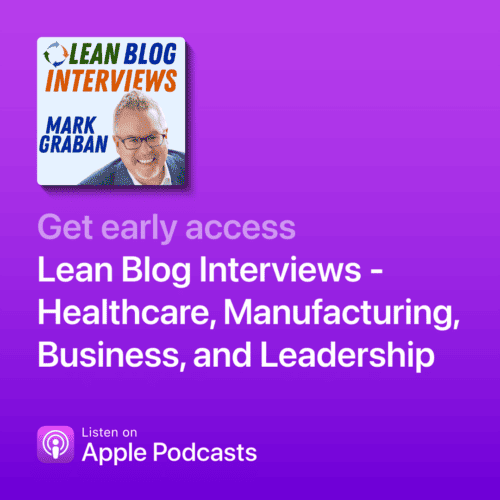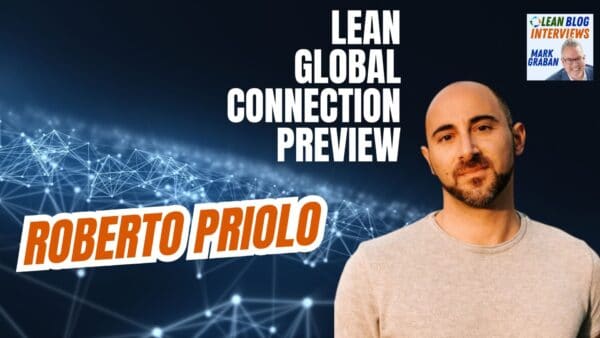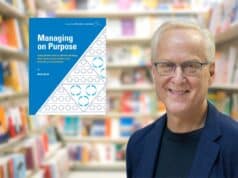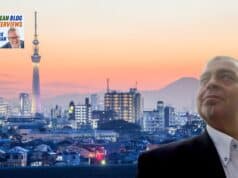Scroll down for how to subscribe, transcript, and more
My guest for this bonus episode of the Lean Blog Interviews Podcast is Roberto Priolo, the Managing Editor of Planet Lean, the publication of the Lean Global Network. Based in Barcelona, Roberto has a background in journalism and extensive experience covering topics such as lean and continuous improvement. Mark and Roberto discuss the upcoming Lean Global Connection event, happening on November 21st and 22nd, 2024, which is a free, 24-hour virtual event designed to bring together the global Lean community.
Key Topics Discussed:
The Origins of the Lean Global Connection Event: Roberto explains how the event began during the pandemic as a way to connect Lean practitioners worldwide when in-person gatherings were impossible. Now in its fourth year, the event continues to thrive, attracting speakers and attendees from over 120 countries.
What to Expect at the 2024 Event: This year's theme, “Developing Adaptiveness in a Changing World,” addresses how Lean can help organizations navigate complex challenges like supply chain disruptions, geopolitical issues, and emerging technologies like AI. The event will feature nearly 100 presentations, spanning 24 hours, with thought leaders sharing real-world case studies, insights, and best practices.
Speakers and Presentations: Mark and Roberto highlight key speakers such as Art Byrne, Jim Womack, John Shook, and many others from around the world. The event will also include external voices to help contextualize Lean's relevance in a broader geopolitical and business landscape.
Psychological Safety in Lean: Mark shares details about his presentation, which will focus on psychological safety as a foundation for continuous improvement. He will explore how creating environments where employees feel safe to speak up about problems and ideas is crucial for effective Kaizen and strategy deployment.
The Lean Social Side: Roberto emphasizes the importance of the “social side” of Lean, which often gets overlooked in favor of technical tools. He stresses the need for reinforcing this message continually within the Lean community to ensure organizations foster environments that prioritize human interaction and psychological safety.
Additional Insights:
The Event Format: The Lean Global Connection is designed as a global festival of Lean thinking, running for 24 hours straight, with two stages running simultaneously. Attendees can join at any time and catch up later with recorded sessions available on the Lean Global Network YouTube channel.
Roberto's Lean Journey: Roberto shares his journey from studying journalism in London to becoming a central figure in the Lean community, managing Planet Lean and contributing to the Lean Global Network's mission of spreading Lean thinking.
How to Join: Register for the free Lean Global Connection event. Mark your calendar for November 21st and 22nd, and be sure to check out previous years' presentations on the Lean Global Network YouTube channel for a taste of what's to come.
Resources Mentioned:
Lean Global Network YouTube channel
Tune in for this exciting conversation with Roberto Priolo to learn more about how the Lean Global Connection continues to bring the world's Lean community together and what to expect in this year's event.
The podcast is brought to you by Stiles Associates, the premier executive search firm specializing in the placement of Lean Transformation executives. With a track record of success spanning over 30 years, it's been the trusted partner for the manufacturing, private equity, and healthcare sectors. Learn more.
This podcast is part of the #LeanCommunicators network.


Full Video of the Episode:
Thanks for listening or watching!
This podcast is part of the Lean Communicators network — check it out!

Automated Transcript (Not Guaranteed to be Defect Free)
Mark Graban:
Hi, welcome to Lean Blog Interviews. I'm your host, Mark Graban. Our guest today is Roberto Priolo. He is the managing editor of Planet Lean. It's a publication I hope you know about. If you're just learning about Planet Lean, look for a link in the show notes. Roberto is a writer and editor based in Barcelona. Before joining the Lean Global Network and launching Planet Lean, Roberto was editor of the Lean Management Journal and associate editor of The Manufacturer magazine. So, Roberto, welcome to the podcast. How are you?
Roberto Priolo:
Hi, Mark. Thanks for having me. Good to be here.
Mark Graban:
Yeah, I wanted to bring you on and talk a little bit about an event I'm really excited about. It's the Lean Global Connection event. I'm going to be one of the speakers in this event on November 21 and 22nd. So tell us a little bit more about it. And it's a free event we should emphasize as well, right?
Roberto Priolo:
Yes. Thank you for that. So the Lean Global Connection is something that the Lean Global Network started four years ago during the pandemic because we had no way of reaching out to the community in the way that we normally do through in-person events. And so we were kind of scratching our heads and thinking, what can we do? That is nothing, I guess, that hasn't been done before. And because we're based all around the world, we have 28 institutes around the world, we thought, okay, what can we do that brings us all together? And so we had this crazy idea of a 24-hour kind of lean festival, showcasing the best cases that we have from the previous year and bringing us all together. That was the genesis of the event. So this year we are at our fourth edition. As you mentioned, it's a free event. The Lean Global Network has a mission to spread lean thinking and practice around the world. Planet Lean, which you also kindly mentioned, is also a free asset that the community has at its disposal to learn more about lean and find cases and thought leadership around it.
Mark Graban:
Yeah. And so the event is, I don't know if it chases the rising sun around the world, or–I mean, it's a 24-hour…
Roberto Priolo:
It is.
Mark Graban:
It's great. A 24-hour-long event with people presenting from all around the world, probably not all 24 time zones, but close to it.
Roberto Priolo:
It is. It starts at 02:00 p.m. UTC, which is 5 hours ahead of–I believe you're on the East Coast of the US. And it goes for 24 hours after that. So, of course, because we have people from places like Chile to Australia, that was kind of like the only way. A lot of people ask us, like, do I need to stick to the whole 24 hours? Do I need to watch the whole 24 hours? And the answer is, of course, no. I mean, you can if you want to. We have some people who do every year, night owls, I guess. But no, you don't have to. The content is typically uploaded a couple of weeks after the event on our YouTube channel. And we also have two free stages happening at once, so of course, you cannot see the whole thing, but that's kind of the point, I think. We want to have this big celebration of what lean is and show how much of it is happening around the world. We have these 30-minute sessions, typically 25 minutes plus 5 minutes for Q&A, and they go on for the 24 hours. And I believe this year we're going to have around 100 presentations. I think last year was 104, so we're probably going to keep around the same number. We have attendees–a few thousand attendees–from around the world. Last year, we had over 120 countries connected and speakers from–I believe it's going to be 30 this year.
Mark Graban:
Okay, well, that's really impressive. And I'm glad that the pandemic necessity of not getting together in person, not traveling internationally, has turned into this global event. And, yeah, I was going to ask you if it's being recorded. I'm glad the answer is yes, because indeed, it seems like far too much to keep up with, and people need their sleep. Absolutely.
Roberto Priolo:
Absolutely. Sorry to cut in, but you mentioned the pandemic. It's quite interesting because every year we wonder, like, does it still make sense to do it because the pandemic is over and there are in-person events now? But the idea is, every year we ask people for feedback, and we always get good feedback. People are loving the event, so we're like, sure, let's keep doing it. And like I said, we believe it's something new and something different, and we want to have that kind of celebration of lean every year.
Mark Graban:
Yeah. And I'll put a link to the Planet Lean website and the page where people can register for the event. That'll be in the show notes, so please look for that. But, yeah, it's funny that there's this day, but with the recordings, I mean, this could generate a year's worth of watching for an individual or for a team, looking at that agenda and sort of plotting out like, hey, even if we were going to watch a couple of videos a week together as a team, there's really a lot of content that's going to come out of it.
Roberto Priolo:
It'll take you a year. Yes, absolutely.
Mark Graban:
To tide people over to 2025. So, you know, scrolling through the list of speakers–people can again find that on the website–just a few familiar faces: Art Byrne, author of many lean books and former CEO of Wiremold; Christoph Roser from Germany–I know a lot of his writing and his work; Daryl Powell from Norway; Fabrice Bernard from France, who I've had here on the Lean Blog Interviews podcast; Jim Womack; John Shook; Lex Schroeder, who used to work for LEI when I was there; Michael Ballé, who people probably know–he's been on the podcast; Robert Martichenko; Sandrine Olavencia–I haven't seen her present, but I recognize her name, of course; Tracy Defoe from Vancouver, Canada, who's been on the podcast here. We've got people from Poland, Taiwan, Ukraine, Turkey, Bulgaria, Slovakia…
Roberto Priolo:
That's right.
Mark Graban:
The list–I'm not going to read every single one.
Roberto Priolo:
That would be a whole podcast. No, what we have this year–of course, we have a theme every year. The theme this year is developing adaptiveness in a changing world. That stemmed from reflections on how messy the world is looking these days and how things are changing. We thought it would be interesting to explore the role of lean in helping organizations develop that flexibility and adaptiveness to face the challenges that the world throws at us. Since the pandemic, we kept talking about going back to normal, and every time it feels like we're not going back to normal, things are getting even more complicated with war, supply chain disruptions, and all of that. AI is another big topic, and we're going to have a few sessions on that. What we're trying to do this year is bring in a couple of external voices as well, just to help people contextualize the theme. We don't just want to look inward within the lean community. For example, we will have Fabrizio Maronta from Italy, who is from a geopolitical magazine, and he's going to help us understand how the world is changing and why businesses around the world should pay attention to geopolitics. So we're really trying to shake things up a little bit. And of course, we're going to have the cases that one would expect from a lean conference.
Mark Graban:
Yeah, well, thank you for highlighting that. And I'm going to be doing a session on a topic that's a favorite of mine–talking about psychological safety as a foundation for continuous improvement. How can we help people feel safe speaking up…
Roberto Priolo:
That's right.
Mark Graban:
…about problems, ideas, mistakes? That's certainly necessary for Kaizen or continuous improvement. It's necessary for catchball and strategy deployment. People have to feel safe even to disagree with their leader. Otherwise, that catchball is not really a back and forth. If people just say to the boss, “Yes, you're right, that's perfect,” when they don't really agree, we know the top lean organizations, whether they realize it or not, have created an environment where people feel safe to speak up. I want to share some thoughts from Amy Edmondson and others who have been leading researchers in the topic of psychological safety. I want to encourage people–if they're doing well with psychological safety but don't have that language around it, great, keep it up. Keep improving. Some organizations sometimes need to take some remedial steps if they're wondering, “Why are people not speaking up? Why are they not sharing ideas?” Instead of blaming the employees, sometimes we need to look at the environment and do some things to not just tell people they should feel safe but to help them truly feel and be safe.
Roberto Priolo:
Absolutely. And I really look forward to your presentation. I'm glad you're touching on this very important topic.
One of the things we've learned from the feedback we get at the LGC and other events is that you never stress certain fundamental points enough when it comes to lean. We have a tendency to think that people, because we've been around as a community for a long time, understand the social side of lean, such as psychological safety. But really, you need to reinforce that message over and over again. You still get people thinking that lean is just a bunch of technical tools. It's wonderful that you're doing that, and thank you for being with us this year.
Mark Graban:
Yeah, well, thank you for the opportunity to do so. And again, I hope people check out the Lean Global Connection event. It's November 21 and 22nd, or depending on your time zones around the world. The website will make that clear, and you can convert from UTC. I hope people will check it out again. It's free. It's going to be great. And if people can't wait, they can go to YouTube and watch some of the presentations from previous years.
Roberto Priolo:
That's right, absolutely. So you can go to the Lean Global Network YouTube channel, where you will find playlists from previous events. You can get an idea of the sort of show we put up and the sort of presentations you can expect. We really hope to have as many of you as possible from this great community. Yes, it's going to be a great event. I'm really excited.
Mark Graban:
Yeah. Well, thanks, Roberto. One other question, out of curiosity, with your background studying journalism, how did you end up in this lean community with the journal and covering manufacturing, and now doing Planet Lean?
Roberto Priolo:
So the lean origin story–by chance, I would say. I moved to London in 2009 to study journalism after I graduated from university in Italy, where I studied political sciences. At school, one of the people on this postgraduate course was the editor of The Manufacturer, and he told me that they were looking for an intern. I needed a job and experience, so I started as an intern for them, then transitioned into freelance work, and eventually became editor of the Lean Management Journal. Through that, I got to meet many of the Lean Global Network people, as well as others in the lean community. That led to my current job at the Lean Global Network, which I started eleven years ago. So it's been a while.
Mark Graban:
Yeah. Well, I'm glad that you're doing so much and being part of the community. Again, I hope people will check out Planet Lean and subscribe or start reading if they're not already doing so. So again, I want to thank our guest today, Roberto Priolo, and really looking forward to the Lean Global Connection event. Thanks for joining us to give an overview and let people know about this event. Thanks again for doing it.
Roberto Priolo:
My pleasure. Thank you for having me, Mark, and goodbye, everyone.
Please scroll down (or click) to post a comment. Connect with me on LinkedIn.
Let’s work together to build a culture of continuous improvement and psychological safety. If you're a leader looking to create lasting change—not just projects—I help organizations:
- Engage people at all levels in sustainable improvement
- Shift from fear of mistakes to learning from them
- Apply Lean thinking in practical, people-centered ways
Interested in coaching or a keynote talk? Let’s start a conversation.










![When Was the Last Time a Leader Around You Admitted They Were Wrong? [Poll]](https://www.leanblog.org/wp-content/uploads/2025/07/Lean-Blog-Post-Cover-Image-2025-07-01T212509.843-100x75.jpg)